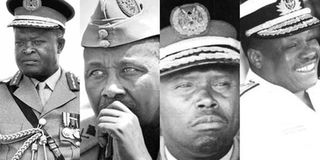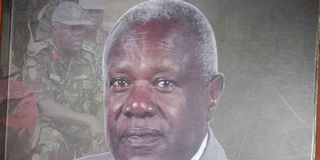Premium
President Daniel Moi and his loyal generals

From left: Generals Jackson Mulinge, Mahamoud Mohamed, Daudi Tonje and Joseph Kibwana. PHOTOS | FILE | NATION MEDIA GROUP
What you need to know:
- He also appointed Lt-Col John Sawe, the then head of transport services, to deputy army commander.
- Tonje, goes down in history as the general who carried out the greatest reforms in the military since independence.
- The changes initiated by General Tonje included repealing a rule that banned women from leading commands in units.
Upon taking office in November 1978, President Daniel arap Moi promoted Jackson Mulinge from army commander to lieutenant-general and appointed him Chief of General Staff, the role in armed forces that his predecessor Mzee Kenyatta had abolished in 1971.
He also appointed Lt-Col John Sawe, the then head of transport services, to deputy army commander.
The appointment of Lt-Col Sawe created a curious situation in which a junior commanded his superior officers, brigadiers.
CREATED A PATH
Soon after, Moi created the path for the rise of Lt-Col Sawe by retiring three brigadiers — Armed Forces Chief of Staff Lucas Matu, Deputy Army Commander Brigadier Peter Kakenyi and Kenya Navy head Brigadier Jimmy Kimaro (he died in an accident), and appointing them to various parastatals, after which he promoted Lt-Col Sawe to a brigadier in 1979.
One of the retired brigadiers, Lucas Matu, died soon after. Another brigadier known as Kathuka Nzioka also died in 1979.
Lt-Col Sawe’s rise saw him promoted to head the army, jumping from lieutenant-colonel to major-general in a year, a meteoric rise that is yet to be beaten.
Tugen Daudi Tonje’s rise, like Sawe’s before him, had been rapid, with four promotions from head of the Defence College to Chief of General Staff in three years”
Following the 1982 coup attempt, the military, like other security services, saw major realignments. But by 1985, there was discontent about the increased number of Kalenjins in senior military ranks.
Upon the retirement of General Mulinge in 1985, rather than make Lt-Gen Sawe CDF, Moi decided to retire him and instead appointed coup hero Mahamoud Mohamed to the position. Major-General James Lengees, a Samburu, took over the army command.
But it was not until 1996, upon the retirement of General Mahamoud Mohamed, that a Kalenjin was appointed as the military chief.
That man was General Tonje, a Tugen just like Moi. Tonje was not just from Moi’s community, he was also married to the President’s sister.
“Tugen Daudi Tonje’s rise, like Sawe’s before him, had been rapid, with four promotions from head of the Defence College to Chief of General Staff in three years,” historian Charles Hornsby writes in the book, Kenya: A History Since Independence.
In his aspirations (General Tonje) wanted a modern and more transparent military. Moi felt that some of the changes were too radical”
Tonje, goes down in history as the general who carried out the greatest reforms in the military since independence.
REFORMS
At some point, Moi had to step in to stop the Chief of General Staff (now known as Chief of Defence Forces, CDF) from carrying out further reforms in the military.
General Tonje also refused an extension of his contract as the military chief, recalls former National Security minister Julius Sunkuli.
“In his aspirations (General Tonje) wanted a modern and more transparent military. Moi felt that some of the changes were too radical,” Mr Sunkuli says.
The reforms initiated by General Tonje included repealing a rule that banned women from leading commands in units where men were based. He also oversaw the Kenyan military shift from a British to an American model of command.
General Tonje also created the position of Vice-Chief of General Staff, to whom all service commanders reported. After the creation of the position, Lt-Gen Jackson Munyao was appointed as the first Vice-Chief of Defence Forces.

Lt-Gen Daniel Opande.
Lt-Gen Munyao served in the position for one year, after which he was replaced by Lt-Gen Daniel Opande, who served until 2000, when he was replaced by Lt-Gen John Koech, who was retired by the Mwai Kibaki government in 2003.
A few years later, instead of being appointed general upon Gen Tonje’s retirement, Lt-Gen Opande was overlooked, the position instead offered to the UK and US-trained Joseph Kibwana, who ended up becoming the first navy man to head the military.
UNITED NATIONS
Lt-Gen Opande, the only man in military circles to be recognised by the title general without having been a full general, was offered a role in the United Nations.
Between 1986 and 1999, Moi was served by service commanders from various communities.
From 1986 to 1993, Lt-Gen James Lengees, a Samburu, was the army commander.
He was succeeded by Lt-Gen Tonje, who served in the post for just a year, after which he was succeeded by Lt-Gen Augustine Arap Cheruiyot, who retired from the post in 1998.
The Kenya Air Force/82 Air Force was under the command of Maj-Gen Dedan Gichuru, a Kikuyu, from 1986 to 1989; Maj-Gen D.K Wachira, also a Kikuyu, from 1989 to 1994; and then Maj-Gen Nick Leshan, a Maasai, from 1994 to 2000.
From 1988 to 1998, Maj-Gen Joseph Kibwana, a Mijikenda, was the navy commander. He was succeeded by Maj-Genl Aboud Rauf Raouf, a Bajuni, who served until his retirement in 2001, upon which he was replaced by Maj-Gen Simon Mutai, a Kamba, who served from 2000 to 2003.
After the Narc government came to power following the defeat of Kanu in the 2002 General Election, all the service commanders and the Vice Chief of General Staff were retired.
RETIRED GENERALS
Those retired included the then Vice Chief of General Staff Lt-Gen John Koech, a Kipsigis; Army Commander Lt-Gen Lazarus Sumbeiywo, a Keiyo; Air Force Commander Maj-Gen Simon Mutai, a Kamba; and Navy Commander Maj-Gen Pasteur Awitta, a Luo.
Lt-Gen Koech was replaced by Maj-Gen Nick Leshan, a Maasai; Lt-Gen Sumbeiywo by Lt-Gen Jeremiah Kianga, a Kamba; Maj-Gen Mutai by Maj-Gen Julius Karangi, a Kikuyu; while Maj-Gen Pasteur Awitta, was replaced by Maj-Gen Mwathethe, a Mijikenda.
Mr Sunkuli, who served as minister of National Security responsible for both the departments of Defence and Interior Security, remembers that among the most trying moments for the Moi presidency was the capture of Kenyan soldiers in Sierra Leone.
The soldiers, who were part of the peace support operation known as the UN Mission in Sierra Leone, were taken hostage in May 2002 when combatants aligned to the Revolutionary United Front attacked their base.
Some soldiers were killed and several injured in the attack.





